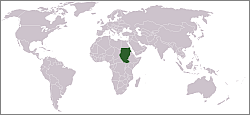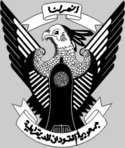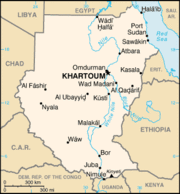Sudan
|
|
The Republic of the Sudan, or Republic of Sudan (in recent years the definite article has increasingly been dropped in common usage) is the largest country in Africa, situated in the northeast part of the continent. The capital is Khartoum. It borders Egypt to the north, the Red Sea to the northeast, Eritrea and Ethiopia to the east, Kenya and Uganda to the southeast, Democratic Republic of the Congo and the Central African Republic to the southwest, Chad to the west, and Libya to the northwest.
| |||||
| Motto: Al-Nasr Lana (Arabic: Victory is Ours) | |||||
| Anthem: Nahnu Jund Allah Jund Al-watan ("We Are the Army of God and of Our Land") | |||||

| |||||
| Capital | Khartoum Template:Coor dm | ||||
| Largest city | Khartoum | ||||
| Official languages | Arabic | ||||
| Government | Authoritarian regime U. H. A. al-Bashir | ||||
| Independence - Date | From Egypt and the United Kingdom January 1, 1956 | ||||
| Area • Total • Water (%) | 2,505,810 km² (10th) 5% | ||||
| Population • 2003 est. • ? census • Density | 38,114,160 (32nd) unavailable 15/km² (195) | ||||
| GDP (PPP) • Total • Per capita | 2003 estimate 68,628 (61) 2,046 (126) | ||||
| Currency | Sudanese dinar (SDD)
| ||||
| Time zone • Summer (DST) | MSK (UTC+3) not observed (UTC+3) | ||||
| Internet TLD | .sd | ||||
| Calling code | +249
| ||||
| Contents |
History
Main article: History of Sudan
Three Kushite kingdoms called northern Sudan home in ancient times. These kingdoms were influenced by, and in turn influenced Pharaonic Egypt.
Although Christianity had been introduced into Sudan in the third or fourth centuries, around AD 640, Islam came to Sudan. A merchant class of Arabs established themselves as economically dominant in feudal Sudan. Important kingdoms in the next 1200 years include Makuria and the Kingdom of Sennar.
Religious leader Muhammad ibn Abdalla, the self-proclaimed Mahdi (Messiah), attempted to unify the tribes of western and central Sudan in the 1880s. He led a nationalist revolt culminating in the fall of Khartoum in 1885, in which the British General Gordon was killed. The Mahdist state survived until being overwhelmed by an Anglo-Egyptian force under Lord Kitchener in 1898. Britain ran Sudan as two essentially separate colonies, the south and the north, until 1956.
After independence the Arab-led Khartoum government reneged on promises to southerners to create a federal system, which led to a mutiny by southern army officers that sparked 17 years of civil war from 1955 to 1972.
Elections were held in April 1965 but Sudan had a series of governments that proved unable either to agree on a permanent constitution or to cope with problems of factionalism, economic stagnation, and ethnic dissidence. Much of the ethnic conflict is born of the North (Arab, Muslim) versus South (African, Christian and animistic) and has a strong economic element in that economic development while under British colonial rule was focused in the North. Dissatisfaction culminated in a second military coup on 25 May 1969. The coup leader, Col. Gaafar Muhammad Nimeiri, became prime minister, and the new regime abolished parliament and outlawed all political parties.
In 1972, the Addis Ababa Agreement led to a cessation of the north-south civil war and a degree of self-rule. This led to a ten-year hiatus in the civil war. In September 1983 President Nimeiri announced his decision to extend Islamic Shari'a punishments into the penal code, re-igniting the civil war.
After shortages of fuel and bread, a growing insurgency in the south, drought and famine, in 1984-5 another military coup led by Gen. Suwar al-Dahab restored a civilian government. However the civil war intensified in lethality and the economy continued to deteriorate. In 1989 General Umar al-Bashir became president and chief of state, prime minister and chief of the armed forces. The Criminal Act of 1991 instituted harsh punishments nationwide, including amputations and stoning.
The ongoing civil war has displaced more than 4 million southerners. Some fled into southern cities, such as Juba; others trekked as far north as Khartoum and even into Ethiopia, Kenya, Uganda, Egypt, and other neighboring countries. These people were unable to grow food or earn money to feed themselves, and malnutrition and starvation became widespread. The lack of investment in the south resulted as well in what international humanitarian organizations call a "lost generation" who lack educational opportunities, access to basic health care services, and little prospects for productive employment in the small and weak economies of the south or the north.
In early 2003 a new rebellion began in the western province of Darfur, during which time the government committed terrible atrocities. In February 2004, the government declared victory over the rebellion but the rebels reported that they remained in control of rural areas and others reports indicated that widespread fighting was continuing.
Peace talks between the southern rebels and the government made substantial progress in 2003 and early 2004, although skirmishes in parts of the south were reportedly continuing. The peace was consolidated with the official signing by both sides of the Naivasha treaty on January 9, 2005, pursuant to which the south will be granted autonomy for six years, to be followed by a referendum on independence. It is hoped that the treaty will finally mark the end of a decades-long war that has claimed millions of lives. Now there is peace between the north and the south. However, there is a genocide occuring in the northern region of Sudan. In Darfur, Arab militas by the name of the Janjaweed are raping, killing and attacking non-muslims. Over 10,000 people are killed a month.
Politics
Main article: Politics of Sudan
Sudan has an authoritarian government in which all effective political power is in the hands of President Omar Hassan al-Bashir. Bashir and his party have controlled the government since he led the military coup on June 30, 1989.
From 1983 to 1997, the Sudan was divided into five regions in the north and three in the south, each headed by a military governor. After the April 6, 1985 military coup, regional assemblies were suspended. The RCC was abolished in 1996, and the ruling National Islamic Front changed its name to the National Congress Party. After 1997, the structure of regional administration was replaced by the creation of 26 states. The executives, cabinets, and senior-level state officials are appointed by the president, and their limited budgets are determined by and dispensed from Khartoum. The states, as a result, remain economically dependent upon the central government. Khartoum state, comprising the capital and outlying districts, is administered by a governor.
In December 1999, a power struggle climaxed between President al-Bashir and then-speaker of parliament Hassan al-Turabi, who was the NIF founder and an Islamist ideologue. Al-Turabi was stripped of his posts in the ruling party and the government, parliament was disbanded, the constitution was suspended, and a state of national emergency was declared by presidential decree. Parliament resumed in February 2001 after the December 2000 presidential and parliamentary elections, but the national emergency laws remain in effect. Al-Turabi was arrested in February 2001, and charged with being a threat to national security and the constitutional order for signing a memorandum of understanding with the SPLA. He was placed in a maximum-security prison and remains in custody.
Foreign relations
Main article: Foreign relations of Sudan
Sudan has had a troubled relationship with many of its neighbors and much of the international community due to what is viewed as its aggressively Islamic stance. For much of the 1990s, Uganda, Kenya and Ethiopia formed an ad-hoc alliance called the "Front Line States" with support from the United States to check the influence of the National Islamic Front government. During this period, Sudan supported anti-Uganda rebel groups such as the Lord's Resistance Army in retaliation for Ugandan support of the Sudan People's Liberation Army. Beginning from the mid-1990s Sudan gradually began to moderate its positions as a result of increased US pressure following the 1998 U.S. embassy bombings and the new development of oil fields previously in rebel hands. While Sudan also has a territorial dispute with Egypt over the Hala'ib Triangle. Since 2003, the foreign relations of Sudan have centered on the support for ending the Second Sudanese Civil War and condemnation of government support for militias in the Darfur conflict.
States
Sudan_political_map_2000.jpg
Main article: States of Sudan
Sudan has 26 states or wilayat: Al Jazirah, Al Qadarif, Bahr al Jabal, Blue Nile, East Equatoria, Junqali, Kassala, Khartoum, Lakes, North Bahr al Ghazal, North Darfur, North Kurdufan, Northern, Red Sea, River Nile, Sennar, South Darfur, South Kurdufan, Unity, Upper Nile, Warab, West Bahr al Ghazal, West Darfur, West Equatoria, West Kurdufan, and White Nile.
Southern Sudan is an autonomous region intermediate between the states and the national government.
Geography
Main article: Geography of Sudan
Sudan is situated in Northern Africa, bordering the Red Sea, between Egypt and Eritrea. It is dominated by the River Nile and its tributaries. With an area of 2,505,810 km?, it is the largest country in the continent. The terrain is generally flat plains, though there are mountains in the east and west. The climate is tropical in the south; arid desert conditions in the north, with a rainy season from April to October. Soil erosion and desertification are environmental hazards.
Economy
Main article: Economy of Sudan
Sudan has turned around a struggling economy with sound economic policies and infrastructure investments, but it still faces formidable economic problems, starting from its low level of per capita output. From 1997 to date, Sudan has been implementing IMF macroeconomic reforms. In 1999, Sudan began exporting crude oil and in the last quarter of 1999 recorded its first trade surplus, which, along with monetary policy, has stabilized the exchange rate. Increased oil production, revived light industry, and expanded export processing zones helped sustain GDP growth at 6.1% in 2003.
Agriculture production remains Sudan's most important sector, employing 80% of the work force and contributing 39% of GDP, but most farms remain rain-fed and susceptible to drought. Chronic instability - including the long-standing civil war between the Muslim north and the Christian/animist south, adverse weather, and weak world agricultural prices - ensure that much of the population will remain at or below the poverty line for years.
See Communications in Sudan, Transportation in Sudan
Demographics
Main article: Demographics of Sudan
In Sudan’s 1993 census, the population was calculated at 26 million. No comprehensive census has been carried out since that time due to the continuation of the civil war. Current estimates from the CIA factbook as of 2004 estimate the population to be about 39 million. The population of metropolitan Khartoum (including Khartoum, Omdurman, and Khartoum North) is growing rapidly and ranges from 6-7 million, including around 2 million displaced persons from the southern war zone as well as western and eastern drought-affected areas.
Sudan has two distinct major cultures--Arabicized Black Africans and non-Arab Black Africans--with hundreds of ethnic and tribal divisions and language groups, which makes effective collaboration among them a major problem.
The northern states cover most of the Sudan and include most of the urban centers. Most of the 22 million Sudanese who live in this region are Arabic-speaking Muslims, though the majority also use a traditional non-Arabic mother tongue--e.g., Nubian, Beja, Fur, Nuban, Ingessana, etc. Among these are several distinct tribal groups: the Kababish of northern Kordofan, a camel-raising people; the Ga’alin (الجعلين), Rubatab (الرباطاب), Manasir (المناصير) and Shaiqiyah (الشايقيّة) of settled tribes along the rivers; the seminomadic Baggara of Kurdufan and Darfur; the Hamitic Beja in the Red Sea area and Nubians of the northern Nile areas, some of whom have been resettled on the Atbara River; and the Negroid Nuba of southern Kurdufan and Fur in the western reaches of the country.
The southern region has a population of around 6 million and a predominantly rural, subsistence economy. This region has been negatively affected by war for all but 10 years since independence in 1956, resulting in serious neglect, lack of infrastructure development, and major destruction and displacement. More than 2 million people have died, and more than 4 million are internally displaced or have become refugees as a result of the civil war and war-related impacts. Here the Sudanese practice mainly indigenous traditional beliefs, although Christian missionaries have converted some. The south also contains many tribal groups and many more languages are used than in the north. The Dinka--whose population is estimated at more than 1 million--is the largest of the many black African tribes of the Sudan. Along with the Shilluk and the Nuer, they are among the Nilotic tribes. The Azande, Bor, and Jo Luo are “Sudanic” tribes in the west, and the Acholi and Lotuhu live in the extreme south, extending into Uganda.
People
- Nuer tribe
- Baggara peoples
- Nuba peoples
- Dinka tribe
- Manasir tribe
- Beja tribe
- Ababde tribe
- Chuluk
- Anjuak
(more with rough locations)
- Ayuak S. Central
- Shililuk E.
- Toposa E.
- Didiga E.
- Latuga E.
- Acholi E.
- Madi E.
- Barit Juba City
- Kakua S.W.
- Zande S.W.
- many more
Culture
Main article: Culture of Sudan
See also
- Military of Sudan
- Prime Ministers of Sudan
- List of cities in Sudan
- Lost Boys of Sudan (Docu-film)
- Human rights issues in Sudan
- Janjaweed
- Not the Sudan nuclear test by the US
- United Nations Mission In Sudan
External links
Government
- Sudan Government (http://www.sudan.gov.sd/english.htm) official site
- Template:Ar icon Majlis Watani (http://www.sudan-parliament.org/) official Parliament site
News
- AllAfrica.com - Sudan (http://allafrica.com/sudan/) news headline links
- Guardian Unlimited - Special Report: Sudan (http://www.guardian.co.uk/sudan/0,14658,1235601,00.html)
- Sudan News Agency (SUNA) (http://www.suna-sd.net/Index_EN.htm) and SunaSMS (http://www.sunasms.com) government sites
- Yahoo! News Full Coverage - Sudan (http://news.yahoo.com/fc/world/sudan) news headline links
Overviews
- BBC News Country Profile - Sudan (http://news.bbc.co.uk/1/hi/world/middle_east/country_profiles/820864.stm)
- CIA World Factbook - Sudan (http://www.cia.gov/cia/publications/factbook/geos/su.html)
- Library of Congress - Country Study: Sudan (http://lcweb2.loc.gov/frd/cs/sdtoc.html) data as of June 1991
Directories
- Arab Gateway - Sudan (http://www.al-bab.com/arab/countries/sudan.htm)
- LookSmart - Republic of Sudan (http://search.looksmart.com/p/browse/us1/us317836/us317916/us559898/us559899/us10065672/us559957/) directory category
- Open Directory Project - Sudan (http://dmoz.org/Regional/Africa/Sudan/) directory category
- Stanford University - Africa South of the Sahara: Sudan (http://www-sul.stanford.edu/depts/ssrg/africa/sudan.html) directory category
- The Index on Africa - Sudan (http://www.afrika.no/index/Countries/Sudan/) directory category
- University of Pennsylvania - African Studies Center: Sudan (http://www.sas.upenn.edu/African_Studies/Country_Specific/Sudan.html) directory category
- Yahoo! - Sudan (http://dir.yahoo.com/Regional/Countries/Sudan/) directory category
Tourism
Other
- Sudan.net (http://www.sudan.net/) portal
| Countries in Africa | ||
|
Algeria | Angola | Benin | Botswana | Burkina Faso | Burundi | Cameroon | Cape Verde | Central African Republic | Chad | Comoros | Democratic Republic of the Congo | Republic of the Congo | Côte d'Ivoire | Djibouti | Egypt | Equatorial Guinea | Eritrea | Ethiopia | Gabon | The Gambia | Ghana | Guinea | Guinea-Bissau | Kenya | Lesotho | Liberia | Libya | Madagascar | Malawi | Mali | Mauritania | Mauritius | Morocco | Mozambique | Namibia | Niger | Nigeria | Rwanda | São Tomé and Príncipe | Senegal | Seychelles | Sierra Leone | Somalia | Somaliland | South Africa | Sudan | Swaziland | Tanzania | Togo | Tunisia | Uganda | Zambia | Zimbabwe | Western Sahara | ||
| Dependencies: Canary Islands | Ceuta and Melilla | Madeira Islands | Mayotte | Réunion | Saint Helena and dependencies | ||



